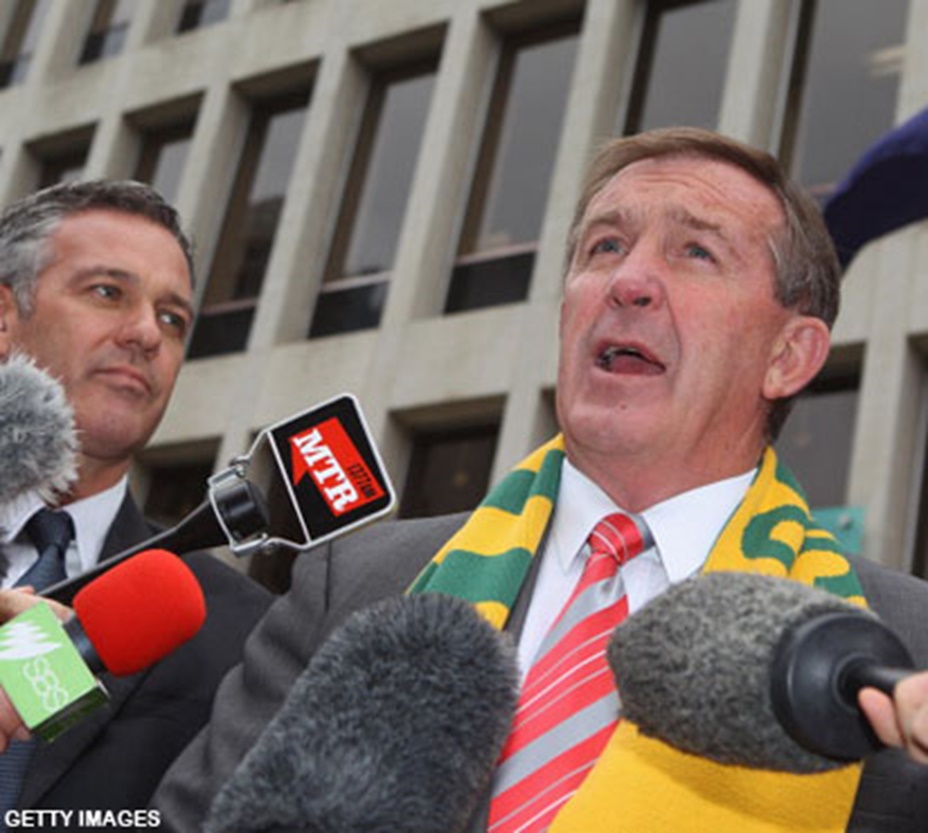State sport ministers will "demand answers" when they meet Australian Senate member Kate Lundy in Melbourne on Thursday, according to Proszenko & Masters of the SYDNEY MORNING HERALD. The Australian Sports Anti-Doping Authority and the Australian Crime Commission will "address an emergency summit," instigated by Victorian Sports Minister Hugh Delahunty. Also on Thursday in Melbourne, CEOs of the major sporting codes will "discuss where their sports stand in relation to the ACC report." The state ministers and the public "have been kept in the dark" since last week's announcement of the ACC's findings into doping in sport and links to organized crime. New South Wales Minister for Sport Graham Annesley said, ''There's no particular agenda other than the states trying to get more information because at this point -- and I'm sure the other sports ministers are the same -- we've got no information over and above what's in the public domain" (SMH, 2/14). In Sydney, Wayne Smith reported the meeting takes place "against the backdrop of growing global athlete discontent" with the World Anti-Doping Agency and its failure to protect "clean" athletes through standard drug-testing methods. Geneva-based peak body of athlete associations UNI Sport PRO has "called for fundamental reform at WADA." The organization claimed WADA and its stakeholders -- which in Australia means ASADA -- "are failing in their mission to protect clean athletes." Australian Athletes Alliance Chair Paul Marsh backed UNI Sport PRO's call for the global athletes' body to be "given a seat at the table in the fight against drugs in sport." March claimed that the various athletes' commissions established by a wide range of sports actually "became part of the sport's internal structure and did not independently represent athletes' interests" (THE AUSTRALIAN, 2/14).
NRL COACH SPEAKS OUT: The AAP reported "fuming" National Rugby League North Queensland coach Neil Henry "slammed the handling" of his club's mention as "embarrassing, disgraceful and farcical." Henry "condemned the ACC's process and was angered his club's name had effectively been forced out publicly in connection with the report before even they knew any detail of the alleged involvement" (AAP, 2/13). NEWS LTD. NETWORK's Benson & Jones reported anti-doping authority investigators "will interview 150 NRL and Australian Football League players, staff and administrators." Between 70 to 80 players and officials "could be charged with doping violations and various penalties, including the potential for lifetime bans from their code." Players who have doped themselves using substances unable to be detected by drug tests are "also being targeted," with ASADA able to take action "based on intelligence" (NEWS LTD. NETWORK, 2/14).
PHONE TAP WORRIES: In Sydney, Chip Le Grand reported the ACC "did not gather any new information about organised crime or doping in sport through telephone taps" as part of its 12-month intelligence operation. Victoria Police Chief Commissioner Ken Lay said that the investigation "has not provided any basis for a criminal investigation." ACC CEO John Lawler said that "no telephone intercept warrants were sought as part of Project Aperio." The absence of telephone taps "will put at ease" athletes and officials at AFL and NRL clubs who had "feared their private conversations were monitored by ACC investigators." It also removes any prospect of a "smoking syringe" conversation between footballers and drug dealers or "unscrupulous sports scientists existing within the ACC's material" (THE AUSTRALIAN, 2/14). Also in Sydney, Ben Packham reported Home Affairs Minister Jason Clare "has defended" the ACC's decision to publicly allege widespread doping in Australian sport in the absence of a single criminal investigation. Clare said that the ACC "would have been wrong to suppress its report on sports doping and organised crime, which cast a shadow over the nation's elite athletes and sporting codes." Clare said, "The Crime Commission made the decision, and I backed them, that it was important to tell the public what was going on here" (THE AUSTRALIAN, 2/13).
BEING HELD ACCOUNTABLE: In Sydney, Cooper, Robinson & Hassett reported Australia's footballing codes "have dismissed concerns" raised by WADA President John Fahey they could do more to police illegal doping by confirming they already compiled the biological passports of their players. AFL Medical Commissioner Peter Harcourt confirmed the league had "long been testing the blood samples of players." Football and rugby union also confirmed that their players "had blood tests taken for biological passports," while rugby league has "reportedly agreed with ASADA to have the records of its players kept" (SMH, 2/14). Also in Sydney, Robert Grant reported AFL Essendon Chair David Evans "could be the only key member of the club's hierarchy to survive" if the Bombers are found to have breached anti-doping rules. Melbourne RMIT University professor of accounting Brendan O'Connell said everyone at the club with a ''hands-on'' involvement in the supplement controversy could be culpable (SMH, 2/14). In Sydney, Brad Walter reported NRL clubs have been told that links with sacked Essendon sports scientist Stephen Dank "were the reason they were being investigated" by the ASADA. The "controversial" biochemist was employed by Manly between '06-10, and was involved with Cronulla for five months in '11, but his links with the other four clubs "were never previously identified." Penrith, Newcastle, Canberra and North Queensland all said that they have "never had any association with Dank," but he told the ACC during two interviews last year that he had "been a consultant to the Panthers and the Cowboys" (SMH, 2/14).




